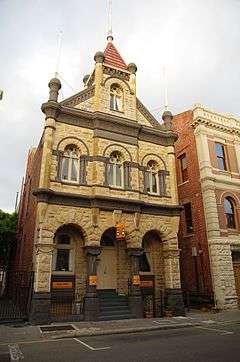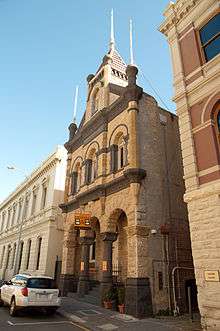Tarantella Night Club
| Tarantella Night Club | |
|---|---|
 Building in 2013 | |
| General information | |
| Location | 32°03′19″S 115°44′34″E / 32.05515°S 115.7429°E |
| Address | 5 Mouat Street |
| Town or city | Fremantle |
| Country | Western Australia |
| Construction started | 1903 |
| Completed | 1903 |
| Technical details | |
| Floor count | 3 |

The former Tarantella Night Club building, also known as the German Consulate and Norddeutscher-Lloyd Building is a heritage building located at Mouat Street in the Fremantle West End Heritage area. The building dates from the gold rush boom period in the late nineteenth and early twentieth centuries and is of historic significance.
Description
The building is an unusual use of stone and Federation Romanesque architecture, especially in Fremantle where the stucco ornamentation of the Free Classical style dominates.[1]
The building occupies all of the lot area and stands alone, separated from adjacent buildings by laneways. It has a narrow frontage and steep pitched gable, the height of which is further accentuated by a castellated tower crowned with a tiled, pyramidal roof and spire. The facade is divided into three bays and has semi-circular arches on the ground floor and above the windows of the floors above. The front facade is dominated by rough cut rock faced limestone and other stone details. Bluestone central columns and plinths have been used on the ground level with freestone brackets supporting the string course at level above. An arch motif is used to decorate the gable.[1]
History
Plans were drawn up by the architect Edward Herbert Dean Smith for William De Lacey Bacon for offices and warehouse to be built at the site in 1902.[2] Bacon was a local investor who had acquired the land in 1901.[1] The three storey stone building was completed in 1903.[3]
The first tenant in the building was L. Ratazzi & Company, a general merchant specialising in wine and spirits, who were also the main representative for Norddeutscher Lloyd Imperial German Mail Steamers. The company were operating from the building by February 1903.[4][5] Laurman Ratazzi was also the Imperial German Consul and later became the Italian Consul. Prior to World War I it was rumoured that Ratazzi used the attic in the building to spy on movements in Fremantle Harbour. Following the outbreak of war Ratazzi was interned and the company's activities were suspended.[1][6]
After the war the building was occupied by various shipping businesses. In 1951 it was purchased and occupied by Dickenson's Transport Agency.[1][7] In 1971, L.H. & A.E. Webb acquired the building and leased it to Jose Faria, who operated the Tarantella night club at the premises. It was at this time that the ground floor internal walls were opened up making a large open space used as a dance floor and bar area. In 1986, Joe Faria and his partner, Joe Rebelo of Lanham Holdings Pty Ltd, purchased the building, and in 1990, offered the freehold for sale at A$695,000. The nightclub continued to operate there, and in 1992 the building was purchased by Fabray Pty Ltd, a division of Fini Homes. In 1993, the night club finally closed and the building was converted for residential use.[1]
See also
References
- 1 2 3 4 5 6 "Register of Heritage Places - Assessment Documentation Tarantella Night Club". Heritage Council of Western Australia. 8 October 1996. Retrieved 27 January 2017.
- ↑ John J.Taylor (2016). "Edward Herbert Dean Smith" (PDF). Western Australian Architect Biographies. Australian Institute of Architects. Retrieved 23 January 2017.
- ↑ "Tarantella Night Club (fmr)". InHerit. Heritage Council of Western Australia. Retrieved 23 January 2017.
- ↑ "Advertising". Kalgoorlie Miner. 8, (18705). Western Australia. 28 February 1903. p. 1. Retrieved 29 January 2017 – via National Library of Australia.
- ↑ "Advertising". The West Australian. XIX, (5,295). Western Australia. 2 March 1903. p. 1. Retrieved 29 January 2017 – via National Library of Australia.
- ↑ "Foreign Company's office". Kalgoorlie Miner. 23, (5852). Western Australia. 16 October 1917. p. 5. Retrieved 29 January 2017 – via National Library of Australia.
- ↑ "Advertising". The West Australian. 67, (20,275). Western Australia. 13 July 1951. p. 16. Retrieved 29 January 2017 – via National Library of Australia.